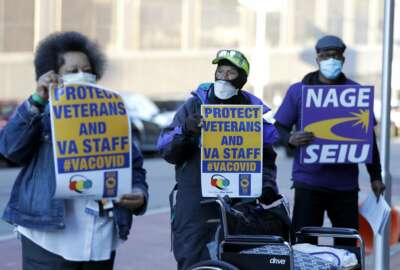

The Veterans Health Administration is tracking 1,293 coronavirus cases among its employees since March, according to the department's public data. The department...
Updates to the Department of Veterans Affairs’ public-facing coronavirus case tracker shed some new light on the number of agency health professionals who have contracted the virus since March.
As of Monday, VA is tracking a total of 1,293 coronavirus cases among VHA employees, according to its recently updated national COVID-19 summary tool.
Of VA’s 1,293 employee cases, a total of 351 of them are active, while 942 are considered “convalescent,” which the department defines as cases where 14 days have passed since the patient’s last positive test or cases where the patient has been discharged from a VA hospital, whichever comes first.
As of April 23, the department had been tracking 1,895 cases among VHA employees, a difference of at least 600 cases between the April figure and today’s totals.
The department acknowledged the difference in reporting.
“The new site only counts employees who were tested at VA,” Christina Noel, a department spokeswoman, said in an email to Federal News Network. “We found that the previous employee case numbers, which were based on employee self-reports, were likely being duplicated in some cases, which was skewing the numbers high and delaying reporting.”
“We’re currently developing a system that will verify employee self-reports to ensure greater accuracy,” she added.
28 VHA employees have died from complications due to the coronavirus, including six at VA’s facility in East Orange, New Jersey, and three each in Indianapolis and Reno, Nevada, according to the department’s latest figures.
VA has been tracking 11,051 cases among veterans, VHA employees, veteran employees and civilian patients who have been tested or treated at department facilities on a cumulative basis since March.
According to its recently updated national COVID-19 summary tool, VA facilities are currently treating some 2,167 veterans across the country. Another 6,262 veterans have entered the convalescent phase, according to the department.
At least 868 veterans have died due to complications from coronavirus, a total that includes veterans who passed away at VA inpatient facilities and cases that have been reported to the department.
VA, meanwhile, has announced a rough plan for how it will begin to resume regular operations at its medical facilities, benefits offices and cemeteries.
Reopening will occur in three phases. Similar to the Trump administration’s guidance to agencies for reopening federal offices, the department will first defer to local health and safety conditions on the ground before determining which facilities can move through each phase, VA Secretary Robert Wilkie said last week.
Once local conditions are met, VA medical facilities may move into phase one of the department’s reopening plan. They may, according to VA, resume some face-to-face appointments and consider conducting elective surgeries that had been postponed during the height of the pandemic.
Under phase two, more elective surgeries and in-person appointments will resume, and by phase three, most VHA employees will return to the office and visitors may be allowed back into hospitals nursing homes and other clinics.
The American Federation of Government Employees, which represents tens of thousands of medical professionals at the VA, has mixed thoughts on VA’s reopening plans.
“They’re going to have to strategically plan for reopening and not just make it a grand reopening for the purposes of revenue,” Yvonne Evans, an AFGE representative and nurse at the VA medical center in Detroit, told reporters last week. “We want our patients to be seen, but we want our patients to be seen safely. Considering we’re in a surgery clinic it is absolutely imperative that this process is implemented correctly. These patients could end up with complications that we definitely did not plan for.”
Evans hasn’t been at work for several weeks because she had tested positive for coronavirus back in March. She said there’s no requirement at her facility that she be tested again for the virus before returning to work, but she doesn’t plan to return until her test comes back negative.
Barbara Galle, a registered nurse and president of AFGE local 3669 in Minneapolis, cautioned VA against bringing elective surgeries back too quickly. The department doesn’t rely on those surgeries for revenue like private sector hospitals do, she said.
Some VA facilities in her region are better prepared than others to resume normal operations, she said. Her facility, however, is still low on cleaning supplies and personal protective equipment.
“Not having enough masks is unprecedented,” Galle said. “Nurses don’t practice wearing one mask for an entire shift. No nurse will tell you that’s a safe practice. You go in one patient room, you take off that mask before you enter another patient’s room.”
Copyright © 2025 Federal News Network. All rights reserved. This website is not intended for users located within the European Economic Area.
Nicole Ogrysko is a reporter for Federal News Network focusing on the federal workforce and federal pay and benefits.
Follow @nogryskoWFED

